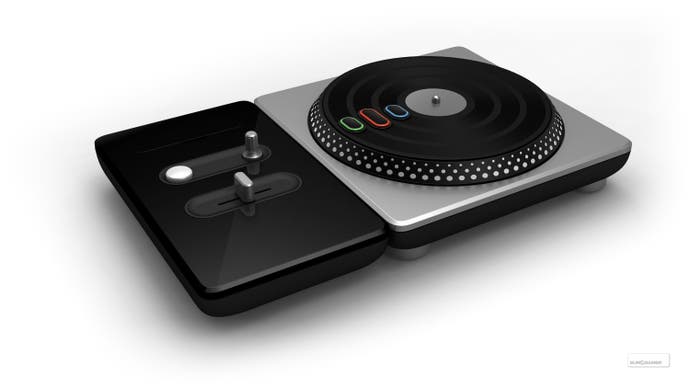E3: DJ Hero
Spinning the light thin plastic.
There's been a sort of inevitability to DJ Hero, an unmistakable sense that once a company realised people would be willing to pay for plastic guitars and drums, it couldn't be long before plastic turntables were on the way too. It's nice to be able to report, then, that the game itself isn't looking as tired and cynical as sceptics' worst fears might have suggested. It isn't even looking competent but boring. Instead, it's looking smart, challenging and extremely enjoyable.
It's probably best to start with the peripheral. The big surprise, for a music game focused on thumping bass lines, is that it's not a plastic Vauxhall Corsa with alloys, under-car strobe lighting and a spoiler. Developer FreeStyleGames has opted for a shiny little turntable and mixing desk instead. The result is excellent: the platter has just the right kind of rubber coating, and the whole unit feels pleasantly weighty, with an option to swap the controls around for lefties, and dials and sliders that aren't going to come off after a few laps around a DJ Shadow track.
The turntable itself has the three stream buttons - green, red and blue - built directly into it, while the other side of the unit handles the mixing desk, with a crossfade slider, an effects dial, and a Euphoria button. Capping it all, the entire thing's small enough to slip under the coffee table, alongside the dusty Wii Fit board and the remains of that half-eaten banana you lost last year, whenever real DJs come to visit.

FreeStyleGames has wisely chosen not to go overboard on the buttons and switches, yet while it's a simple enough controller, it's one that translates into a surprisingly deep game. It starts off in a straightforward enough fashion: as with Guitar Hero, players must press the correct buttons at the correct times to hit the notes, the green and blue buttons representing the two different records you're mixing, with the red one in the middle laying down samples.
The first complication comes with scratching, dictated by on-screen arrows, and the second quickly follows with the crossfader, which must be slid back and forth between the two records as directed by a kink in the neon line that represents each track on-screen. Hitting streaks allows you to build up Euphoria, which seems to behave a lot like Star Power (that entire thought will make no sense to anyone reading after emerging from a 10-year coma), while a separate Rewind metre allows you to go back over a healthy point-scoring patch for a second time to blast your way up the leaderboard. Or you could go back over a low-score section again if you're an idiot.
While the game has undeniably come from the same lineage as the Guitar Hero series, a delicate rebalancing is evident. Some changes are immediately visible: the colour scheme has wholeheartedly embraced a clinical disco neon, while the endless fretboard highway of the original titles has become a gently curving arc of vinyl, and the various hard-rock stereotypes lumping around on screen have been replaced with weird caricatured DJs and swaying techno crowds.


